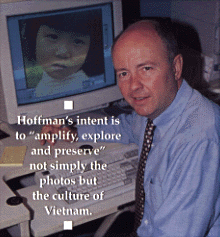



Former Army Photographer Refocuses on Vietnam
   
|
Alumni Former Army Photographer Refocuses on Vietnam |
|
Like all Army photographers stationed in Vietnam, Kenneth Hoffman, BS'66 (F-M), would take photos depicting the war for the U.S. government. But Hoffman was equally concerned with illustrating the people and the culture of Vietnam. So, in his free time, he traveled, observed and recorded what he calls "the character of everyday existence." He says, "I was documenting the war in the faces of the people who had to live through it." And, beginning earlier this year, a selected group of nearly 100 of Hoffman's personal photos were included in a special exhibit. But you won't find these pictures in a gallery, open only during certain hours and accessible to just those nearby. Instead, this exhibit is available 24 hours-a-day throughout the world, courtesy of the worldwide computer network known as the Internet. Hoffman's pictures had received limited exposure until this year. That's when he and a colleague saw an opportunity to combine the technology of digital photography and the World Wide Web, the graphical portion of the Internet. From his more than 1,500 images, he selected some of his finest work. The site can be found at http://icarus.shu.edu:80/gallery/V_Portfolio and is organized in six categories: Children; Montagnard Tribesmen (various peoples inhabiting the highlands of central and southern Vietnam); Military; Vietnamese People; Protest, et cetera; and Shrines. Hoffman's intent is to "amplify, explore and preserve" not simply the photos but the culture of Vietnam. An integral part of that mission is fulfilled by the interactive capabilities on the World Wide Web. Viewers of the photos are able to leave their comments about the pictures or any aspect of Vietnam, and others can respond to those comments. The interaction has been phenomenal. Since the site came on line in March, individuals from more than 50 countries have offered comments. While school was in session, the site averaged more than 175 visitors a day. In effect, the exhibit has turned into a discussion group on Vietnam. "The photos have become a catalyst, promoting discussion and providing opportunities to respond," Hoffman says. 
Through the site, ex-soldiers revisit their gripping experiences, Vietnamese embrace their war-torn homeland, and young students try to understand what even contemporaries of the war are unable to grasp. Many of the comments focus, like the pictures themselves, on the people and culture. One respondent wrote, "The thing that struck me is the incredible diversity that exists in Vietnam." Another remarked, "The eyes of the children tell more than the surroundings they are in. I see eyes filled with terror and wonder." But political issues also play a large role in the discussions and the topic most discussed is "Why did the United States lose the war?" The answers are as diverse as the pictures. Hoffman wants to collect the commentary of persons living through this period, as well as Vietnamese scholars, to complement the pictures. He hopes to record this era in Vietnam's history on CD-ROM in the form of a self-guided multimedia presentation with narratives and music accompanying the pictures. Hoffman's interest in the preservation of culture was manifested early in his life, when he took photos for his high school yearbook. At FDU, he not only met his wife, Candyce Jenkins Hoffman, BS'69 (F-M), but also continued his interest in visual arts. The business major was inspired by a film course with then Assistant Professor of Fine Arts Carl Linder and decided to pursue studies in television and motion-picture production. He later received a master of fine arts degree in filmmaking from New York University and then, in 1968, landed a commission in the Army. Hoffman spent a year in Vietnam as a photo detachment supervisor in Pleiku and as an officer-in-charge of a motion-picture news team in Saigon. Soon after his service career, he started teaching at Seton Hall University, South Orange, N.J., and has been there ever since. An associate professor in the communication department, he has taught photography, computer graphics, digital photography and computer animation. He also has written a textbook, Computer Graphics Applications, with Jon Teeple. Devoted to historical preservation, Hoffman is past chairman of the Morristown Historic Preservation Committee and supplied photos for a book about Mendham, N.J., architecture. But his main project now is preserving the story of Vietnam - the whole story. As one person commented, "Thank you for keeping the memories alive." -A.C. |
FDU Home +
Visitor's Center +
News/Publications +
Admissions +
Alumni +
Academic Programs +
Faculty +
Student Services/Campus Life +
Help/Comments +
Hotlinks +
Personal Pages
|